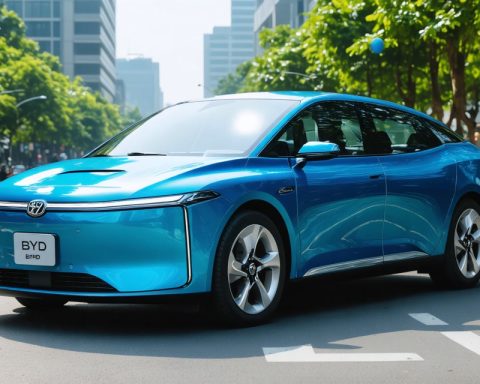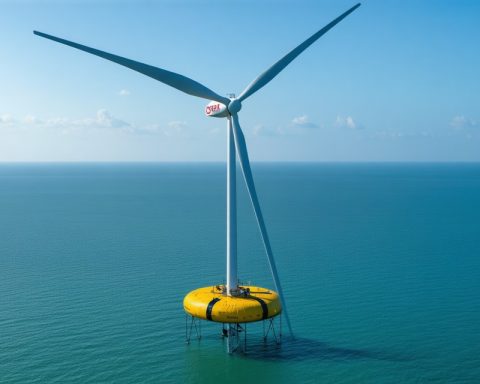- Namibia is poised to become a leader in green hydrogen, a sustainable energy source poised to fuel Europe’s future.
- Shark Island, near Lüderitz, has a grim history as a site of atrocities during German colonial rule, now targeted for infrastructure expansion.
- The expansion efforts threaten to overlook the island’s historical significance, raising concerns of modern energy colonialism.
- The ocean and land in Namibia hold deep cultural and historical value, requiring a balance between sustainable progress and preservation.
- Initiatives like those from Black Court Studio seek to honor Namibia’s legacy and advocate for reconciliation amidst development pressures.
- The international community must ensure Namibia’s green transition respects and preserves its rich cultural and historical narratives.
A sun-drenched peninsula in Namibia silently bears the weight of its tragic past while standing on the brink of a green revolution. Namibia aims to transform itself into a powerhouse of green hydrogen, a promising eco-friendly energy source expected to fuel Europe’s future. Yet, the very lands and oceans targeted for this transformation echo with haunting memories for the Namibian people.
Shark Island, nestled near the quaint town of Lüderitz, is slated for critical infrastructure expansion. Today, tourists flock to its picturesque campsites, unaware of its chilling past as “Death Island.” This site witnessed atrocities during German colonial rule, where countless Namibians suffered and perished in concentration camps. The waters nearby became a final resting place for many, a silent witness to a grim history that remains etched in local memory.
The spirits of those lost whisper caution as Namibia stands on the precipice of becoming a green hydrogen hub. Port expansions in Walvis Bay and Lüderitz pose imminent risks to the preservation of Shark Island’s historical significance. Critics argue this represents a modern form of energy colonialism, a pursuit where green aspirations risk repeating colonial injustices.
Namibia’s ocean is viewed not only as a natural resource but a sacred space, woven with cultural and historical significance. Initiatives by groups like Black Court Studio aim to honor this legacy by fostering a deeper connection with the past and advocating for reconciliation.
The fervent drive for sustainable energy solutions must navigate the delicate balance between progress and preservation. The world must recognize these cultural and environmental narratives, ensuring Namibia’s path to a green future doesn’t erase the stories of those who once walked its shores.
Unveiling the Future: Namibia’s Green Hydrogen Ambitions Amidst Its Historical Legacy
Namibia’s Green Hydrogen Vision: A Real-World Use Case
Namibia is on the cusp of becoming a global leader in green hydrogen production, aiming to supply sustainable energy to Europe. This initiative involves using Namibia’s rich solar and wind resources to produce hydrogen through a process called electrolysis, which splits water into hydrogen and oxygen using renewable energy. This eco-friendly hydrogen is poised to be a key player in reducing global carbon emissions, aiding in the transition to cleaner energy solutions.
Historical Context and Environmental Concerns
Namibia’s green hydrogen project is centered around areas steeped in historical significance, including Shark Island near Lüderitz. The island’s past as a location of a German colonial concentration camp presents a moral dilemma. These lands are sacred spaces for many Namibians, and current development plans have sparked debate over cultural preservation versus modern economic ambitions.
How-To Steps for Balancing Preservation and Progress
1. Engage with Indigenous Communities: Meaningful dialogue with local communities ensures that initiatives respect cultural heritage and acknowledge historical injustices.
2. Incorporate Memorials or Museums: Develop infrastructure that includes spaces for memorials or museums to educate visitors on the historical significance of these sites.
3. Implement Stringent Environmental Regulations: Work with environmental experts to minimize ecological impact while pursuing economic development.
Market Forecasts and Industry Trends
The global demand for green hydrogen is expected to surge, with predictions indicating the market could reach USD 1 trillion by 2050. Namibia’s potential lies in its ability to produce low-cost hydrogen, with its vast solar capacity and available land being key advantages. Countries like Germany are looking towards Africa as a potential green hydrogen supplier, with Namibia seen as a strategic partner.
Controversies and Limitations
– Energy Colonialism Concerns: Critics argue that foreign investments in Namibia’s hydrogen sector risk repeating patterns of economic exploitation reminiscent of colonial times.
– Environmental Impact: While hydrogen is a clean energy source, the infrastructure development required could threaten local ecosystems and wildlife.
Security and Sustainability
Investments in Namibia’s green hydrogen industry must consider long-term sustainability to avoid resource exploitation. Utilizing technology for monitoring the environmental impact and ensuring the security of the supply chain is crucial for the project’s success.
Insights and Predictions
As Namibia navigates its historical complexities, the nation could set a precedent for integrating renewable energy with cultural preservation. Namibia’s approach may inspire other countries with similar historical burdens to pursue green energy ambitions.
Pros and Cons Overview
Pros:
– Potential to become a leading green hydrogen exporter.
– Economic growth and job creation for Namibians.
– Contribution to global carbon reduction goals.
Cons:
– Risk of neglecting historical and cultural sites.
– Potential ecological disruptions due to infrastructure projects.
– Concerns about foreign exploitation and energy colonialism.
Actionable Recommendations
– Study Namibia’s History: Before investing or engaging with initiatives in Namibia, understand the country’s historical context and collaborate with local historians.
– Promote Inclusive Dialogue: Encourage transparent discussions among stakeholders, including government officials, local communities, and international investors.
For more about Namibia’s transition towards a sustainable future, visit Namibia Tourism.


















